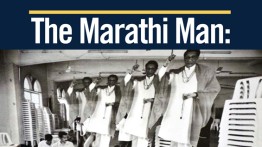The Marathi Man: The Decline of the Left and the Emergence of Reactionary Masculinity in Colonial Bombay
Wednesday, December 1, 2021, 5 - 6pm

The figure of the dreaded “Marathi Manoos” has dominated politics in Bombay for nearly seven decades. The term signifies lumpen and resentful Marathi-speaking men, native to the region, who have failed to benefit from the economic growth of the postcolonial city. They are a terrifying right-wing force in Bombay today, practicing a politics of violence, xenophobia, and misogyny, but how did the Marathi Manoos come to be? Historians and anthropologists of South Asia have thus far argued that this reactionary figure is a product of postcolonial right-wing politics. HSS Professor Ninad Pandit's talk will take a heterodox approach to show how the Marathi Manoos was, counterintuitively, a product of the city’s progressive working-class movement in the pre-colonial 1930s-40s. Drawing on archival sources ranging from labor statistics and political speeches to popular theater and literature, the talk will argue that the left’s inability to produce a coherent vision for a decolonized India led to a rightward swing in left-anticolonialism, and this figure of a lumpen worker became the standard bearer of an enduring politics of resentment.
Please join us in room LL 101 or join virtually by registering here.
Ninad Pandit is an architect, urban planner, and historian of modern South Asia. His scholarship examines the relationships between urbanization, industrialization, and the emergence of radical politics in colonial India.
Professor Pandit’s book manuscript, The Bombay Radicals, is based on his dissertation and tells the story of working-class organizations in western India, from their origins in caste reform movement to their embrace of socialism and the Communist International and eventual decline into regional chauvinist political parties. After the Bolshevik Revolution of 1917, a group of young organizers—the Bombay Radicals—were inspired by the international working-class movement to expand the ideals of late-19th century caste reformers to encompass all industrial workers in India. They built one of the largest workers’ movements in the colonial world. At the same time, their engagement with anti-colonial politics of the Indian National Congress revived older linguistic and regional chauvinist ideas that would undermine the progressive import of this movement.
Professor Pandit received his Ph.D. from the Department of History at Princeton University. He previously trained as an urban planner and designer with a degree in City Planning/Design from the Massachusetts Institute of Technology and as an architect at KRVIA, Mumbai University. He has previously worked and taught at Yale University as the Singh Postdoctoral Fellow and at LSE Cities, London School of Economics and Political Science as the Mellon Fellow in Cities and the Humanities.




